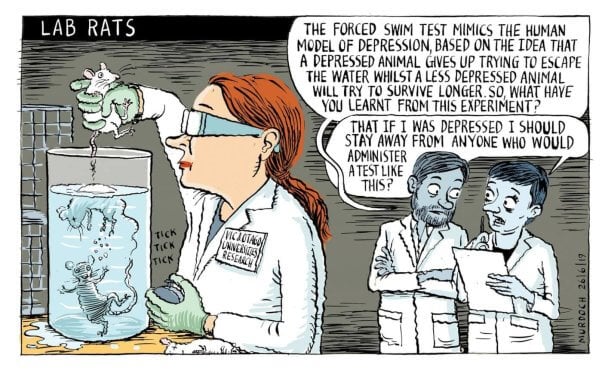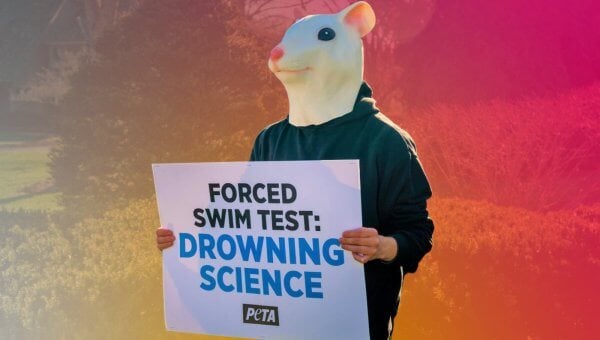New Paper by PETA Scientists Tackles Flawed Pharmaceutical Experiments on Animals
PETA scientists are once again leading the charge against scientifically unfit experiments on animals. This time, their new paper tackles two of the most pointless pharmaceutical tests that make mice and rats fear for their lives in inescapably terrifying situations.
For “The Need for Guidance in Antidepressant Drug Development: Revisiting the Role of the Forced Swim Test and Tail Suspension Test,” published in the esteemed journal Regulatory Toxicology and Pharmacology, PETA scientists and advocates from around the globe teamed up to provide real-world guidance for no longer using the forced swim test, in which animals swim for their lives in beakers of water, and the tail suspension test, in which they’re hung upside down by their sensitive tails.


These experiments are not only cruel but also bad science. They consistently fail to provide reliable results about which drugs can help humans, yet they are commonly used by pharmaceutical companies to test antidepressants.
PETA vs. Cruel and Unreliable Science
PETA neuroscientist Dr. Emily Trunnell (the lead author), in collaboration with scientists and animal advocates from PETA U.S., PETA U.K., and PETA Germany as well as the Physicians Committee for Responsible Medicine, Animal-Free Science Advocacy, and the New Zealand Anti-Vivisection Society, makes a watertight case for ending the pharmaceutical industry’s use of the forced swim and tail suspension tests by providing action steps to the International Council for Harmonisation of Technical Requirements for Pharmaceuticals for Human Use. This influential council issues guidance for regulatory agencies and pharmaceutical companies, including the U.S. Food and Drug Administration.
Better Guidelines for Animal-Free Research
Some regulators now encourage pharmaceutical companies to pursue superior animal-free testing methods for new drug submissions, but there is no clear guidance against the use of the worthless forced swim and tail suspension tests. General guidelines are also needed for testing drugs’ effectiveness before they reach human trials.

To remedy this situation, the paper urges the council to take the following actions:
- Establish a working group to examine whether tests like the forced swim and tail suspension tests are fit for purpose, suggest standards for testing the effectiveness of drugs before they advance to human trials, and suggest non-animal alternatives that pharmaceutical companies can use
- Accept public comments on the working group’s recommendations
- Use the above information to develop policies and guidelines for testing whether psychiatric drugs may be effective for humans
Many leading pharmaceutical companies have abandoned the forced swim test, and the U.S. Food and Drug Administration doesn’t require it for drug development. Yet some companies refuse to cast aside the pointlessly tortuous experiment.

PETA’s article urges the council to levy its power and align pharmaceutical guidelines with the rapidly evolving scientific understanding of superior non-animal methods in order to ensure that animals aren’t tormented in useless experiments that don’t help humans.
Help PETA Scientists End the Forced Swim Test
Pharmaceutical giant Sanofi has tormented more than 1,500 animals in the forced swim test—and failed to produce a single usable antidepressant.
Please TAKE ACTION by telling Sanofi to join leading pharmaceutical companies in banning this cruel and scientifically worthless test:


